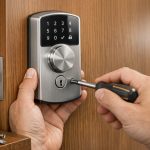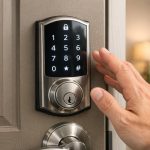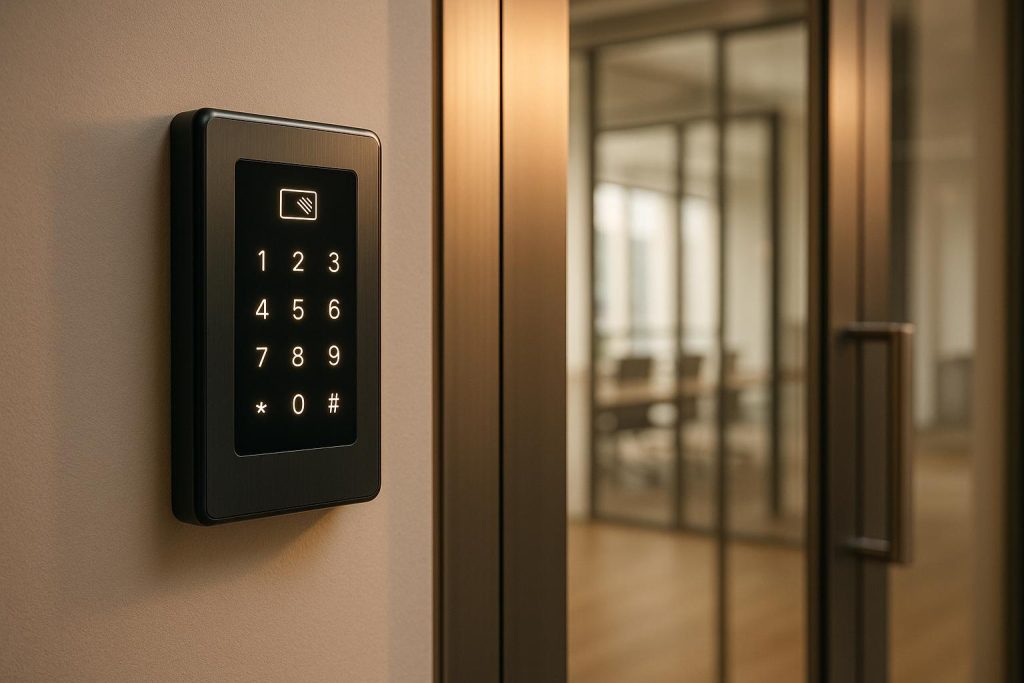Keyless entry systems are transforming how businesses manage security by replacing physical keys with digital solutions like PIN codes, key cards, biometrics, and mobile apps. These systems offer:
- Increased control: Instantly revoke access for lost credentials or ex-employees without rekeying locks.
- Enhanced monitoring: Detailed logs show who accessed specific areas and when.
- Convenience: Manage access remotely and issue temporary credentials for visitors or contractors.
- Cost savings: Avoid expenses tied to rekeying locks and duplicating physical keys.
The Executive Centre: Best Keyless Entry Systems for Shared Office Spaces – Case Study
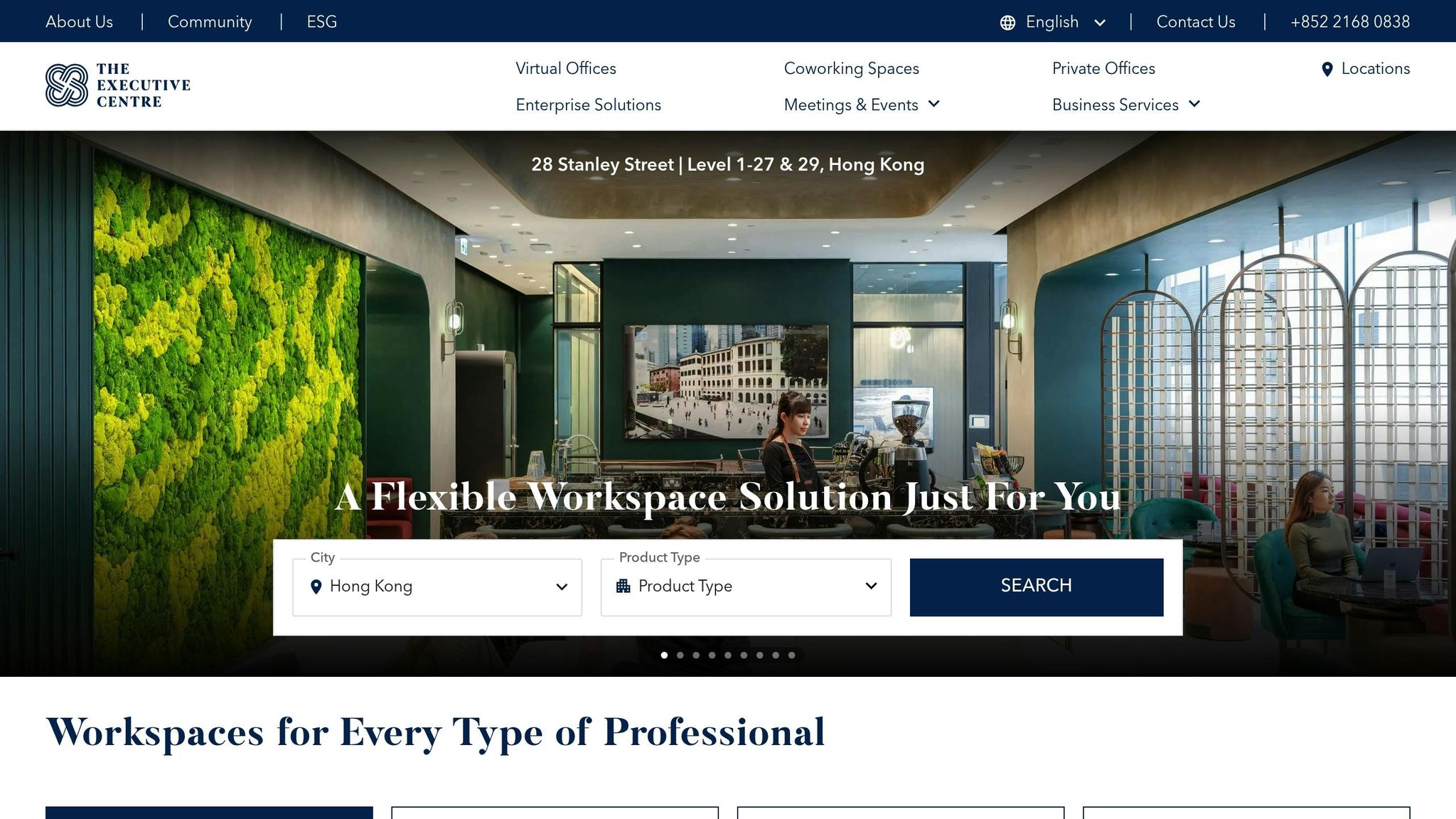
Common Business Security Challenges
Relying on traditional lock-and-key systems can lead to gaps in security, leaving sensitive areas exposed and making it harder to meet the demands of modern security protocols.
Access Risks from Lost or Stolen Keys
When keys are lost, they pose a major security threat. Until the locks are changed, those keys remain functional, leaving facilities vulnerable. Plus, physical keys can be duplicated without much effort, making it nearly impossible to track how many copies exist or who might have unauthorized access.
Employee Turnover and Rekeying Costs
High employee turnover often forces businesses to rekey locks to prevent former employees from accessing restricted areas or business premises. This process doesn’t just come with a financial cost – it can also disrupt daily operations, especially for companies managing multiple entry points.
Difficulty in Access Tracking and Compliance
Traditional locks don’t offer insights into who accessed specific areas or when, which becomes a serious issue for businesses in industries that require detailed access logs. Without reliable tracking or time-based access controls, these systems make it harder to investigate incidents or meet compliance requirements. This highlights the need for systems that not only secure facilities but also simplify access management.
Key Features of Keyless Entry Systems
Modern keyless entry systems are designed to tackle the common challenges of lost keys and inefficient access management. By combining advanced authentication methods with real-time monitoring, these systems offer a more secure and reliable way to control access, addressing the shortcomings of traditional methods.
Biometric Authentication
Biometric technology has revolutionized identity verification by relying on unique physical traits that can’t be easily lost, stolen, or duplicated. Fingerprint scanners analyze ridge patterns, while facial recognition systems assess distinct facial features to confirm identities.
These systems are built to function effectively even when users wear glasses or experience minor changes in appearance, making them practical for everyday use. They also boast low false acceptance rates, minimizing the chances of unauthorized access. Some systems go a step further by combining multiple biometric methods – such as fingerprints and facial recognition – into a single authentication process, enhancing security without sacrificing convenience.
Mobile and Digital Credentials
While biometrics focus on physical traits, mobile and digital credentials provide a flexible, app-based approach to access management. Instead of carrying keys or physical cards, users can unlock doors using mobile apps that communicate with readers via Bluetooth or NFC.
This flexibility is especially valuable for businesses. For example, managers can instantly grant temporary access to contractors, delivery staff, or visitors without needing to issue physical keys. These digital credentials can also be programmed with time restrictions, limiting access to specific hours or days.
If a mobile credential is misused, the system can flag the activity and immediately revoke access. Similarly, digital badge systems use contactless card technology with encrypted chips, which communicate securely with scanners. These cards are resistant to cloning or duplication, adding another layer of security.
Audit Trails and Remote Management
One standout feature of keyless entry systems is their ability to maintain detailed audit trails. Every access attempt is logged with precise timestamps, user details, and location information, creating a tamper-proof record. This is invaluable for investigations and regulatory compliance.
Real-time monitoring further enhances security by tracking access as it happens. Administrators receive instant alerts for incidents like doors left open too long, multiple failed access attempts, or unauthorized entry into restricted areas.
Remote management capabilities are particularly useful for businesses with multiple locations. Security teams can adjust permissions, review logs, and respond to incidents from any device with internet access, eliminating the need for on-site visits. For example, when an employee leaves the company or loses their access device, administrators can immediately disable their credentials across all entry points, reducing potential risks.
These systems also allow for scheduled changes, such as automatically updating access permissions for temporary staff, contractors, or seasonal workers. This ensures that access is always aligned with the organization’s needs while maintaining a high level of security.
sbb-itb-643e28e
How Keyless Entry Systems Solve Business Security Problems
Keyless entry systems provide practical answers to many of the security challenges businesses face. By eliminating issues like lost keys and the expense of rekeying, they simplify access management while reducing vulnerabilities.
Preventing Access Breaches
Keyless systems are designed to tackle the risks of unauthorized access head-on. Traditional keys can easily fall into the wrong hands if lost or stolen, creating significant security gaps. In contrast, keyless systems rely on digital credentials and biometric verification, both of which are far harder to duplicate or misuse. Whether it’s fingerprint scans or mobile-based credentials, these methods offer a higher level of security.
Mobile credentials add another layer of protection by allowing administrators to act quickly if a device is lost or suspicious activity is detected. Access can be revoked instantly across all entry points. Plus, encrypted communication ensures that mobile credentials can’t be reused without authorization, keeping security breaches at bay.
Streamlining Employee Onboarding and Offboarding
Managing employee turnover is simpler and more secure with keyless entry systems. Instead of dealing with physical keys, administrators can grant or revoke access permissions in real time using management software. Whether it’s issuing credentials through a mobile app, biometric enrollment, or digital key distribution, new hires can gain secure access immediately.
Keyless systems also allow for fine-tuned access control. Permissions can be customized based on job roles, so an accounting clerk might only access specific office areas, while a maintenance worker could have broader permissions but still be restricted from sensitive zones. This tailored approach enhances security and eliminates the need for expensive rekeying.
Temporary access is another advantage. Contractors, consultants, or seasonal workers can be given credentials that automatically expire when their work is done. This ensures that access is granted only for the necessary duration, making short-term access management both secure and efficient.
Supporting Regulatory Compliance and Rapid Incident Response
For industries with strict compliance requirements, keyless systems offer detailed record-keeping and monitoring tools. These systems generate audit trails that log every access event, including timestamps, user information, and entry locations. Such detailed records not only help meet regulatory standards but also aid in investigating security incidents.
Additionally, keyless systems can integrate with existing security tools like video surveillance and alarm systems. This creates a comprehensive security framework, enabling teams to match access logs with visual data for quicker and more effective incident responses.
The Importance of Professional Installation and Support
Keyless entry systems demand careful planning, precise setup, and consistent maintenance to safeguard your business. If installed poorly, these systems can lead to security gaps, compatibility problems, and expensive downtime.
Professional locksmiths bring the expertise needed to integrate these systems seamlessly. They handle everything from wiring to mounting and calibration, ensuring that biometric scanners and electronic locks function as they should. Without this level of technical know-how, businesses often encounter issues like malfunctioning devices, false rejections, or even total system failures at critical times.
The challenge grows with multi-door setups and centralized management systems. Professional installation ensures that access remains synchronized across all entry points and that backup systems are ready to step in during outages.
Keeping keyless entry systems performing at their best also requires regular updates, hardware checks, and troubleshooting. Professional locksmith services provide the technical skills necessary to maintain these systems, addressing potential issues before they compromise security.
In short, professional support is what connects a high-quality installation to long-term system reliability.
Sherlock’s Locksmith Expertise
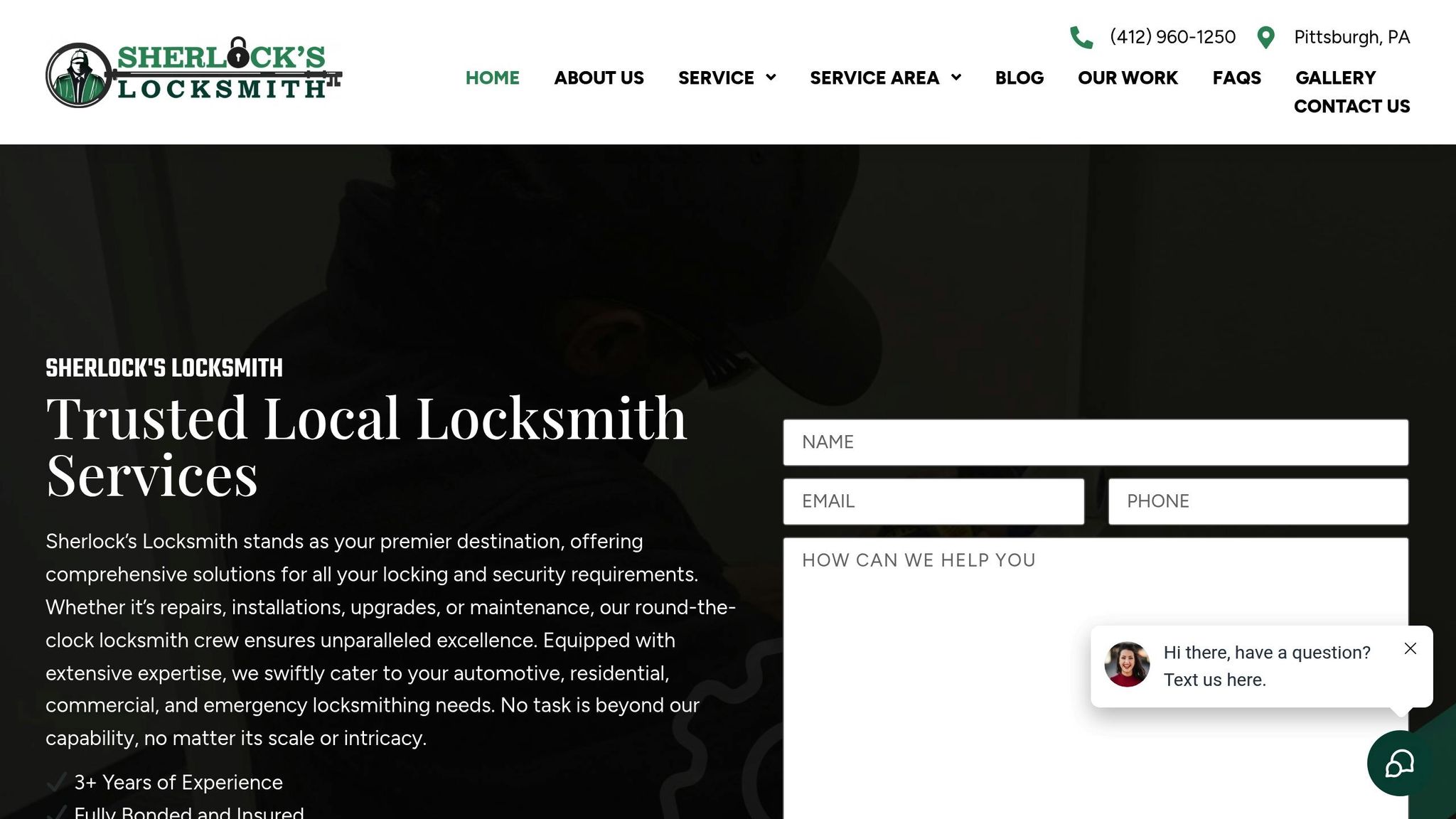
Recognizing the importance of expert installation and ongoing support, Sherlock’s Locksmith delivers top-notch services to ensure your keyless entry system works flawlessly. Based in Pittsburgh, PA, the company specializes in commercial locksmith services, offering tailored solutions for keyless entry system installation and maintenance. Their certified technicians use advanced tools and technologies to deliver reliable access control systems designed to meet the unique needs of businesses.
Sherlock’s Locksmith provides a range of commercial locksmith services, including access control systems, master key systems, and security consulting. Their expertise also covers electronic security options such as keyless entry systems, biometric locks, and alarm systems, ensuring seamless integration of various security technologies.
What truly sets Sherlock’s Locksmith apart is their 24/7 emergency support. When keyless entry systems fail or need urgent repairs, businesses can’t afford delays. Their mobile locksmith team ensures that certified technicians respond quickly, minimizing disruptions and maintaining security.
Beyond installation, Sherlock’s Locksmith emphasizes proper system configuration and user training. Their technicians ensure that access permissions are correctly set, audit trails are configured, and employees know how to use the system effectively. This thorough approach helps businesses avoid common pitfalls and maximize the value of their security system from day one.
Conclusion: Improving Business Security with Keyless Entry Systems
Keyless entry systems enhance security by addressing common vulnerabilities like lost keys and expensive rekeying, while also offering precise access control and monitoring.
Features such as biometric authentication, mobile credentials that can be activated instantly, and detailed audit trails provide a strong yet manageable security solution. These systems not only improve safety but also cut costs by allowing managers to deactivate digital credentials quickly or grant temporary access without needing physical keys.
Access logs play a crucial role in helping businesses comply with regulations and respond promptly to security incidents. However, the effectiveness of these systems depends heavily on proper installation and consistent maintenance.
Reliable performance requires skilled installation and access to qualified professionals for routine upkeep and emergency repairs. Without this, even the most advanced keyless systems can fall short of expectations.
Adopting a keyless entry system can transform a business into a more secure, efficient, and accountable operation. With the right system and expert support, businesses can protect their assets and concentrate on what they do best.
FAQs
How do keyless entry systems enhance business security compared to traditional locks?
Keyless entry systems take security to the next level by swapping out traditional keys for encrypted access codes or digital credentials. These modern alternatives are far more difficult to copy or steal compared to physical keys. Plus, they come with the added convenience of remote access management. This means you can easily update permissions, deactivate lost credentials, and even track entry activity in real time.
Another major advantage is how they handle common issues like employee turnover or misplaced keys. Instead of going through the hassle (and expense) of changing locks, you can simply adjust access settings instantly. With the ability to control who enters your business and when, keyless entry systems offer a practical way to strengthen security while making life a whole lot easier.
What are the advantages of using biometric authentication in keyless entry systems for businesses?
Biometric authentication provides businesses with a secure method to manage access by using distinct physical or behavioral characteristics like fingerprints or facial recognition. These unique traits make it far more challenging for unauthorized individuals to bypass security, significantly lowering the chances of breaches or identity theft.
Beyond its security benefits, biometric systems also boost efficiency by simplifying access control processes. Employees can quickly verify their identity without relying on physical keys or cards, cutting down on time spent and eliminating the hassle of managing lost or stolen credentials. This not only saves time but also reduces administrative overhead.
Why is it important to have keyless entry systems professionally installed and maintained?
When you opt for professional installation, you’re ensuring your keyless entry system is set up the right way from the very beginning. Experts know how to configure these systems to work seamlessly, minimizing the chances of errors or weak points that could compromise security.
But installation is just the first step. Keeping your system in top shape requires regular maintenance. Routine inspections can catch hardware problems early, while software updates help guard against new security risks. For businesses, this is especially crucial to prevent unauthorized access and maintain a secure environment around the clock.




